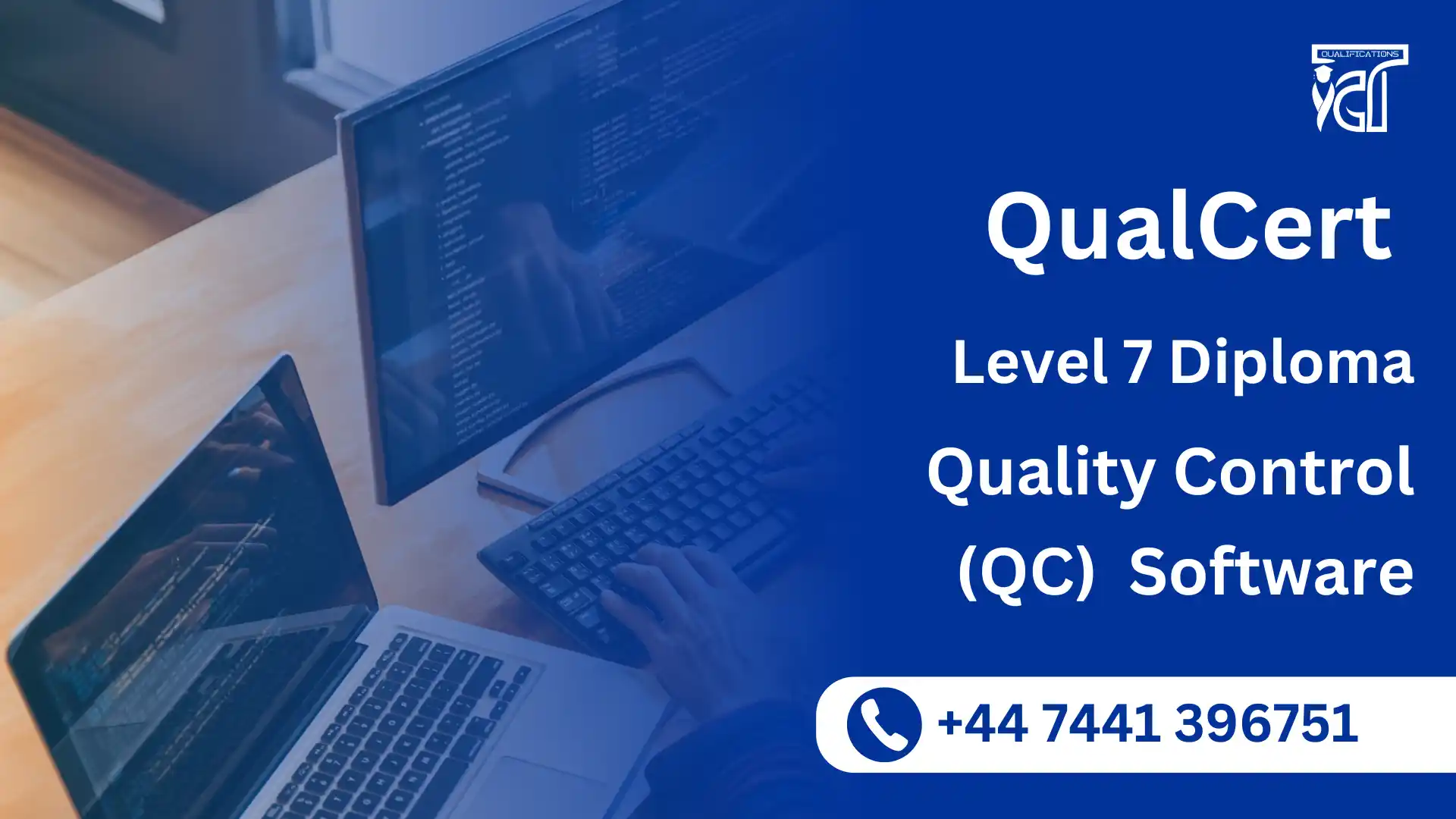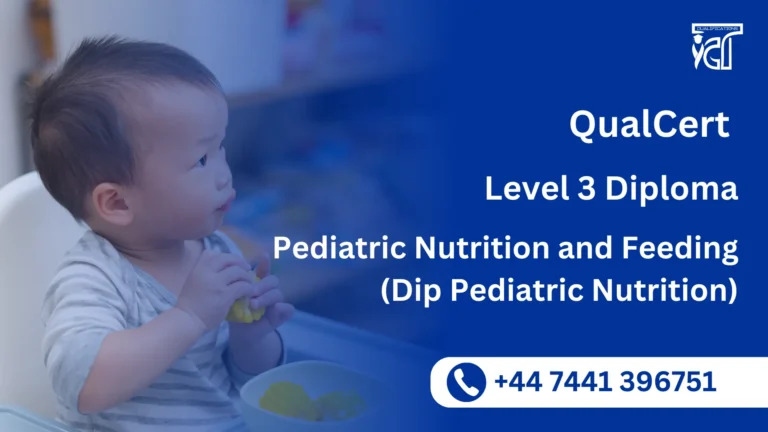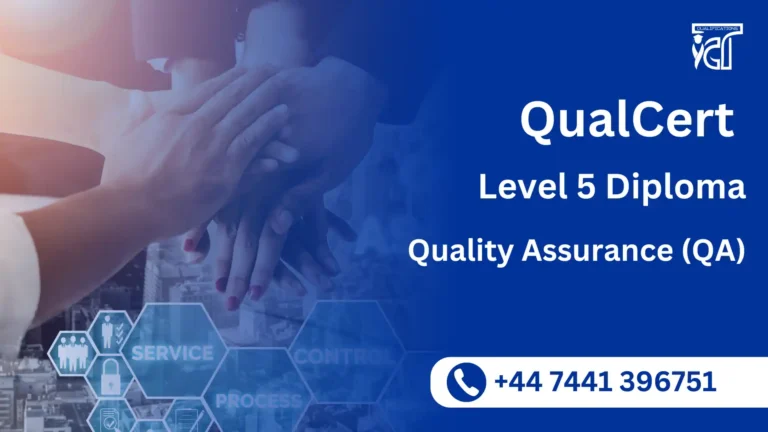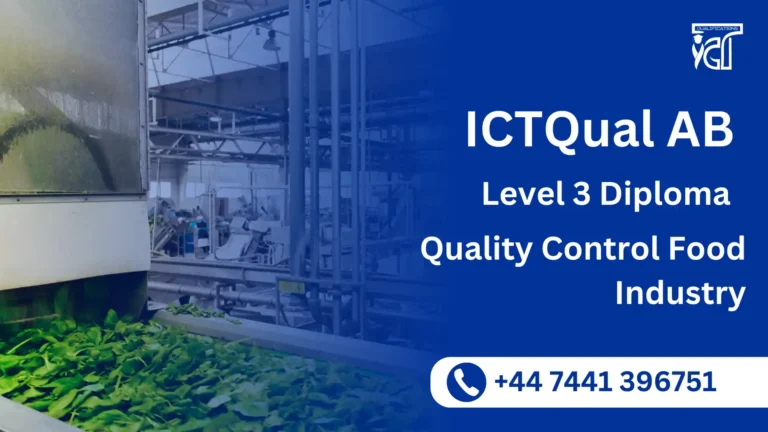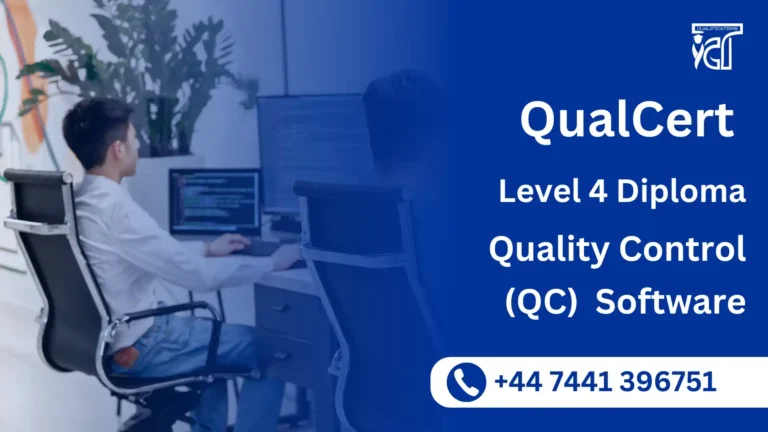The QualCert Level 7 Diploma in Quality Control (QC) Software is a high-level qualification designed for experienced professionals and aspiring leaders in the field of software quality assurance and control. This advanced diploma provides in-depth knowledge and strategic skills required to ensure the quality, functionality, reliability, and security of complex software systems in line with international standards.
With the rapid advancement of technology and the growing importance of reliable software in business, healthcare, finance, and government operations, quality control has become a critical area of expertise. This qualification equips learners with the ability to design, manage, and improve quality control processes throughout the software development lifecycle (SDLC). It focuses on areas such as automated testing, quality frameworks, software compliance, audit management, risk mitigation, and agile QA strategies.
The diploma is ideal for quality assurance engineers, software testers, IT project managers, and technical leads who seek to take their knowledge to a strategic level. Learners will explore both theoretical frameworks and practical tools to ensure software products meet user requirements, legal standards, and organizational goals.
By completing this qualification, professionals will be positioned to lead quality initiatives, implement continuous improvement practices, and contribute significantly to organizational performance and customer satisfaction in the software industry.
QualCert Level 7 Diploma in Quality Control (QC) Software
The QualCert Level 7 Diploma in Quality Control (QC) Software comprises several study units designed to provide learners with a comprehensive understanding of QC principles and practices in the software sector. Below is the qualification structure, including the Total Qualification Time (TQT) 1200, Guided Learning Hours (GLH) 600, and 120 Credits associated with the program.
| Unit Ref# | Unit Title | Credit | GLH | TQT |
| QC11014 – 1 | Quality Control Strategy and Leadership | 20 | 100 | 200 |
| QC11014 – 2 | AI-Driven QC Systems for Industry 4.0 | 20 | 100 | 200 |
| QC11014 – 3 | Global Best Practices in QC Software | 20 | 100 | 200 |
| QC11014 – 4 | Governance, Risk, and Compliance in QC | 20 | 100 | 200 |
| QC11014 – 5 | Big Data and QC Decision Making | 20 | 100 | 200 |
| QC11014 – 6 | Innovation and Future Trends in QC Software | 20 | 100 | 200 |
GLH (Guided Learning Hours) and TQT (Total Qualification Time) are terms commonly used in vocational qualifications to help define the amount of time a learner is expected to spend on their studies.
1. GLH (Guided Learning Hours)
GLH refers to the number of hours a learner spends being directly taught, supervised, or supported during their course. This includes the time spent in activities such as:
- Classroom instruction
- Practical workshops
- One-on-one tutoring or mentoring sessions
- Online learning sessions with tutor support
In other words, GLH represents the time that learners are actively engaged with their instructors or learning activities.
2. TQT (Total Qualification Time)
TQT represents the total amount of time a learner is expected to invest in completing a qualification, including:
- GLH (Guided Learning Hours): Time spent on direct learning, as explained above.
- Self-Directed Learning: This includes time spent on independent study, research, assignment completion, preparation for exams, and any other work the learner does outside of direct teaching hours.
TQT is a broader measure that includes all the time required to achieve the qualification. It helps learners and employers understand the overall commitment required for the qualification.
Key Differences Between GLH and TQT:
- GLH focuses on direct learning with guidance or supervision.
- TQT includes GLH as well as independent study time and other learning-related activities.
Example:
If a qualification has a TQT of 600 hours and a GLH of 250 hours, it means the learner should spend 250 hours in direct learning (classroom, online, or tutor-led sessions) and 350 hours on independent study or research.
Strategic Quality Control Leadership
- Design and implement comprehensive quality control strategies within software development environments.
- Lead and coordinate high-performing quality assurance teams to align with organizational goals.
- Embed robust quality frameworks across the Software Development Life Cycle (SDLC).
- Identify and address software quality risks to enhance system reliability and performance.
- Drive strategic decision-making through effective quality management practices.
AI-Enabled Quality Control for Industry 4.0
- Analyze the integration of artificial intelligence in next-generation quality control systems.
- Apply AI and machine learning tools to automate testing and improve defect detection.
- Enhance QC performance through intelligent data processing and predictive modeling.
- Evaluate the effectiveness and limitations of AI-powered QA solutions.
- Align software QC processes with the demands of Industry 4.0 and digital transformation.
Global Standards and Best Practices in Software QC
- Apply internationally recognized quality control models, such as ISO/IEC standards and CMMI frameworks.
- Conduct effective software testing, validation, and verification based on global benchmarks.
- Ensure compliance with international legal and regulatory software requirements.
- Foster a culture of continuous improvement within software development and QA processes.
- Compare and elevate internal practices by benchmarking against global industry leaders.
Governance, Risk, and Compliance (GRC) in Software QC
- Establish governance structures to support quality-focused software development.
- Identify and manage quality-related risks across complex software projects.
- Implement compliance protocols in line with industry and jurisdictional regulations.
- Develop risk-based quality assurance methodologies tailored to various development models.
- Enhance internal audit and compliance systems within software quality control functions.
Big Data Analytics in Quality Decision-Making
- Utilize big data and advanced analytics to monitor and improve software quality.
- Extract actionable insights from large datasets to prevent defects and enhance QA.
- Apply predictive analytics for proactive quality control and risk anticipation.
- Optimize test case selection and resource allocation using data-driven methodologies.
- Strengthen decision-making with real-time dashboards and data visualization tools.
Innovation and Emerging Trends in Software Quality Control
- Explore disruptive technologies transforming the software quality landscape, including automation, AI, and blockchain.
- Assess the implications of technological innovation on quality assurance practices.
- Foster an innovative mindset in designing and executing modern QC strategies.
- Anticipate and respond to future challenges in global software quality management.
- Develop adaptive quality frameworks that align with evolving digital ecosystems.
1. Master Strategic Quality Leadership
Gain the skills to lead complex software quality control initiatives at an executive level. This diploma empowers you to create and implement quality strategies that align with organizational goals and international benchmarks.
2. Advance in AI-Integrated Quality Systems
Stay ahead of the curve by learning how artificial intelligence and machine learning are transforming quality control in software development. You’ll be equipped to implement AI-driven testing solutions and manage intelligent QA processes aligned with Industry 4.0 standards.
3. Global Recognition and Compliance Expertise
Learn to apply global quality standards such as ISO, CMMI, and Six Sigma within software projects. You’ll gain expertise in ensuring compliance with international regulations and best practices, making you a valuable asset in multinational environments.
4. Data-Driven Decision Making
Harness the power of big data and predictive analytics to identify defects, monitor performance, and make proactive quality decisions. The course helps you build competencies in leveraging data for real-time insights and continuous improvement.
5. Enhance Governance, Risk, and Compliance (GRC) Skills
This qualification prepares you to manage governance structures, assess risks, and implement compliance protocols across software development lifecycles—essential for roles in quality assurance leadership and audit preparation.
6. Stay Ahead with Innovation in Software QC
Explore future trends, including blockchain, automation, and digital transformation, and learn how to adapt QC frameworks accordingly. This forward-looking approach positions you as an innovation leader in quality assurance.
7. Career Growth and Industry Mobility
This Level 7 diploma opens pathways to senior roles such as Quality Assurance Director, Software QC Consultant, or Compliance Manager. It also supports academic progression to postgraduate qualifications (e.g., Master’s in Quality Management or Software Engineering).
Ideal Learner for QualCert Level 7 Diploma in Quality Control (QC) Software
Experienced Software Quality Professionals
This diploma is ideal for software testers, QA managers, or quality control engineers with significant experience who are looking to enhance their strategic, leadership, and technical skills in advanced software quality assurance.
IT Managers and Project Leaders
Those managing software development teams or overseeing project delivery will benefit from gaining in-depth knowledge of quality frameworks, compliance requirements, and risk management strategies essential for high-stakes digital projects.
Engineers and Developers Aspiring to Leadership Roles
Software engineers, system architects, or developers aiming to move into leadership or quality assurance roles will gain a broader perspective on quality systems, AI integration, and global compliance protocols.
Compliance, Audit, and Governance Professionals
Professionals working in software governance, regulatory compliance, or internal auditing will find this diploma valuable for expanding their capabilities in quality standards, documentation, and continuous process improvement.
Tech Entrepreneurs and Product Owners
Start-up founders and product leads seeking to ensure high-quality software output and compliance in their digital products will benefit from practical skills in quality control design, implementation, and innovation management.
Those Seeking International Recognition
Learners aiming to work on global projects or relocate internationally will appreciate the focus on global best practices, standards like ISO/IEC, and alignment with Industry 4.0 technologies.
Entry Requirements
Entry Requirements: QualCert Level 1 Diploma in Quality Control (QC) – Electrical
Age Requirement:
Applicants must be at least 16 years of age at the time of enrollment. This ensures participants have the maturity to engage with basic technical and safety concepts.
Educational Background:
A basic secondary school education is recommended. While no formal qualifications are strictly required, learners should possess a general understanding of numeracy and literacy, as these are essential for interpreting technical information and completing assessments.
Work Experience:
No prior work experience in electrical or technical fields is necessary. This course is designed for beginners and individuals starting their journey into electrical quality control.
English Language Proficiency:
Learners should have a basic understanding of the English language, both written and spoken, as course materials and instructions are delivered in English. This will enable them to follow lessons, complete assignments, and understand safety documentation.
Register Now
Qualification Process
Qualification Process for the QualCert Level 7 Diploma in Quality Control (QC) Software
- Self-Assessment:
Begin by evaluating your eligibility to ensure you meet the qualification requirements, including work experience, knowledge, and language proficiency. - Registration:
Complete your registration by submitting the required documents, including a scanned copy of a valid ID, and paying the registration fee. - Induction:
An assessor will conduct an induction to confirm your eligibility for the course and explain the evidence requirements. If you do not meet the criteria, your registration will be canceled, and the fee will be refunded. - Assignmnets & Evidence Submission:
Provide all assignmnets and the necessary evidence based on the assessment criteria outlined in the course. If you are unsure of the required evidence, consult with the assessor for guidance on the type and nature of evidence needed. - Feedback and Revision:
The assessor will review your submitted evidence and provide feedback. Evidence that meets the criteria will be marked as “Criteria Met,” while any gaps will be identified. You will be asked to revise and resubmit if needed. - Competence Evidence:
Submit final evidence demonstrating that all learning outcomes have been met. This evidence will be marked as “Criteria Met” by the assessor once it is satisfactory. - Internal Quality Assurance (IQA):
The Internal Quality Assurance Verifier (IQA) will review your evidence to ensure consistency, quality, and compliance with standards. - External Verification:
The IQA will submit your portfolio to QualCert External Quality Assurance Verifiers (EQA) for final confirmation. The EQA may contact you directly to verify the authenticity of your evidence. - Certification:
Upon successful completion of all checks, QualCert will issue your official certificate, confirming that you have attained the QualCert Level 7 Diploma in Quality Control (QC) Software.

